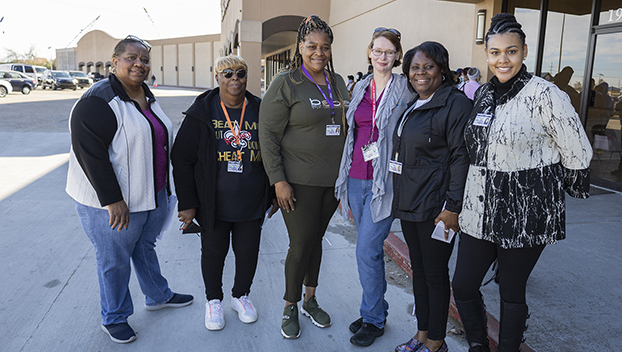Louisiana Spirit Counseling shares tips for coping with disaster or traumatic events
Published 12:06 am Saturday, March 26, 2022

- Representing Louisiana Spirit Crisis Counseling, Veda Bailey, Edith Farlough, Tyiece Howard, Renee Ring, Pennie Kendrick and Lauren Owens disseminate resources to hurricane survivors in the New Wine parking lot.
|
Getting your Trinity Audio player ready...
|
LAPLACE — Members of the Louisiana Spirit Crisis Counseling Team recently attended the St. John the Baptist Parish Council meeting in LaPlace to share information on mental health resources available to survivors of Hurricane Ida.
The Louisiana Spirit Crisis Counseling Program, commonly referred to as Louisiana Spirit, is operated during a presidentially declared disaster under the oversight of the Louisiana Department of Health, Office of Behavioral Health. Its mission is to assist individuals and communities in recovering from the effects of disaster through the provision of free, community-based outreach and psycho-educational services.
Services include individual and group crisis counseling, basic supportive or educational contact, community networking, assessments/referrals/resources, development and distribution of educational materials, and media and public service announcements.
A Crisis Assist Link Line is available to provide immediate assistance to individuals with a behavioral health crisis, concerns or questions. Master level counselors can provide support, crisis resolution/prevention, resource determination, direct referral and follow-up. Call 1-877-500-9997 for assistance. Individuals experiencing a medical emergency should call 911.
At this week’s Parish Council meeting, the Louisiana Spirit team also disseminated information on coping with a disaster or a traumatic event.
After a disaster occurs, it is important to pay attention to how you and your family are feeling. Caring for your mental health after a traumatic event will help you process the event better and protect you and your family. This information will help you and your family recover and find support.
Signs of distress
- Feeling shocked, numb or in disbelief
- Difference in energy or activity
- Trouble concentrating
- Feeling more or less hungry than usual
- Increase in anxiety, fear and anger
- Increased or new headaches, body pains and skin conditions
- Health problems worsening
- Abuse of alcohol, tobacco or drugs
If these signs persist over several days and impact your day-to-day life, see your healthcare provider.
How to Help Children Cope
- Talk openly to them
- Share age-appropriate information
- Discuss rumors and facts about the event
- Answer questions
- Reassure them
- Let them talk about their experience with the event
- Be a good example for them by caring for yourself
- Limit their exposure to media coverage of the event
Steps to Take Care of Yourself
- Care for Your Body
- Eat healthy, exercise frequently, practice good sleeping habits, decrease alcohol consumption and tobacco use and avoid drug abuse.
- Connect With Others
- Share your feelings and emotions with those you have a close relationship with such as a friend or family member. Maintain your relationships and rely on your support system.
- Take Breaks
- Allow yourself time to unwind. Return to the activities you enjoyed prior to the disaster or traumatic event.
- Stay Informed
- Watch the news to stay up to date, but avoid too much exposure to media.
- Ask for Help
- Talk to a clergy member, counselor, doctor, or call the Office of Behavioral Health’s Keep Calm Line at 1-866-310-7977.





